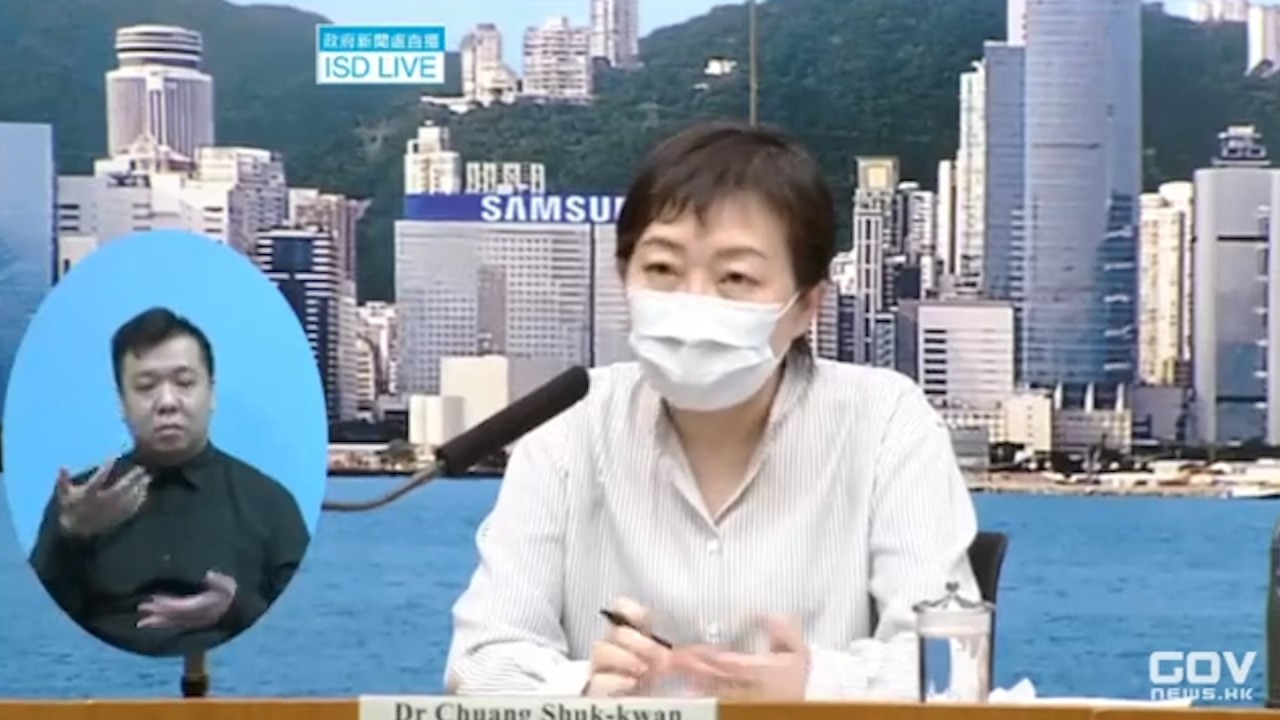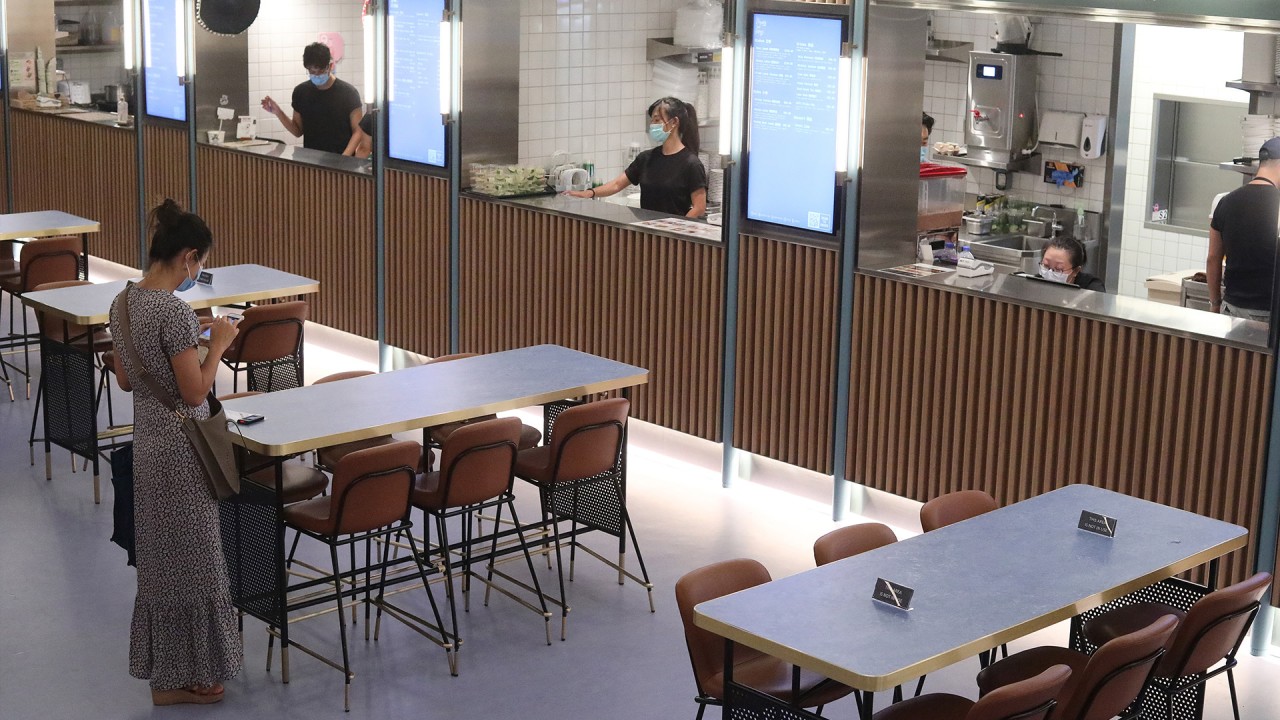
Hong Kong third wave: Covid-19 infections soar to record high of 67, more than half from unknown source
- Government assessing whether to order civil servants to work from home
- Ticket issued to owner of dim sum place for breaching evening dine-in ban, representing first legal action under sweeping measures
Coronavirus infections in Hong Kong hit an all-time daily high of 67 cases on Thursday, more than half of them untraceable, as the government weighed ordering civil servants to work from home amid pressure from health experts and unions.
There is still a chance more cases are coming
The number of new infections exceeded the previous daily record of 65 cases, which were mostly imported, recorded on March 27. But even worse numbers could lie ahead, warned Dr Chuang Shuk-kwan, head of the communicable disease branch at the Centre for Health Protection.
“I cannot say this is a peak because usually you can only say it is a peak afterwards,” Chuang said. “There is still a chance more cases are coming.”

01:29
Hong Kong records 67 new confirmed Covid-19 cases, with 35 of unknown origin
Among the 63 new local infections, 35 are from an unknown source, continuing an alarming trend that poses challenges for health officials trying to limit infection risks within the community. Since July 6, 120 out of 299 local infections have been untraceable.
“When they are untraceable, then you can’t find all their close contacts and isolate them, which means community outbreaks will go on happening,” said Professor David Hui Shu-cheong, a respiratory medicine expert at Chinese University.
A clearer understanding of the danger should emerge by next Wednesday, a week after the preventive measures were stepped up and enough time for newly infected people to begin displaying symptoms, according to Hui.
We will review the situation, follow up on the pandemic and decide the next step
The four imported cases were two arrivals from the Philippines, and one each from India and Indonesia. The latest infections push the city’s overall tally to 1,655 cases, with 10 related deaths. More than 10 people also tested preliminary positive on Thursday.
The surge in cases recently has prompted the Department of Health on Thursday to change its quarantine policy for people returning from high-risk areas, such as India, Pakistan and Bangladesh. Such arrivals would have to undergo a mandatory 14-day quarantine in hotel rooms rented by the government, instead of at quarantine centres.
The department said the arrangement would be implemented if the number of arrivals from high-risk areas exceeded the capacity of quarantine facilities on a given day, “as these centres must be prioritised for close contacts of confirmed patients”.
Those requiring quarantine would be transferred in coaches to the hotel rooms, where they would need to wear an electronic wristband during the period. A government source said they would stay on floors separate from other hotel guests.
During the first wave of Covid-19 infections in January, the administration ordered some of the city’s roughly 180,000 civil servants to work from home, although most disciplined services staff and other frontline employees were excluded.
While Chief Executive Carrie Lam Cheng Yuet-ngor dismissed the idea of working from home for civil servants providing services directly to the public as recently as Monday, Undersecretary for Food and Health Dr Chui Tak-yi said the government was assessing the situation.
How serious is Hong Kong’s third wave of Covid-19 infections and what can be done?
“We are aware of the trend of cases,” Chui said. “We will review the situation, follow up on the pandemic and decide the next step. We will continuously and very closely monitor the situation and adjust the measures accordingly.”
The Civil Service Bureau has already issued guidelines on the latest social-distancing measures to various departments, including allowing them to decide whether staff can voluntarily work from home.
More government employees have become infected, including an amenities assistant under the Leisure and Cultural Services Department who worked at the Tsuen King Circuit Wu Chung Swimming Pool in Tsuen Wan.

02:12
Hong Kong bans dine-in service from 6pm to 5am to contain its third wave of Covid-19 infections
The Housing Department also revealed a senior technical officer who worked at its Ho Man Tin headquarters had contracted the virus. A customs officer who tested preliminarily positive on Wednesday was also among the newly confirmed.
But a representative from one of Hong Kong’s leading unions said the government should immediately order some civil servants to work from home.
“I don’t understand why the government has not implemented a forced work-from-home arrangement now, when the extent of community outbreak is more serious than that in February,” said Chan Chiu-wai, an organising coordinator with the Confederation of Trade Unions.
Hui, who advises the government on its pandemic strategy, said many private companies were not allowing staff to work from home because the government had not introduced such arrangements for its own staff.

Hui said he understood the administration wanted to maintain public services and had implemented flexible working hours as a way to mitigate the Covid-19 risks, but the crowds he saw on the streets and taking public transport were increasing the chances of community contagion.
“I hope companies that aren’t providing emergency services can allow staff to work from home for some time. It doesn’t have to be long, perhaps just one to two weeks. It can help break the chain of virus transmission in the community,” he said.
Asked whether the government should take the lead and introduce work-from-home arrangements to encourage the private sector to follow suit, Hui said he believed the authorities would change their strategy if the infection figures remained high in the coming days.
Hong Kong records a second Covid-19 death in space of hours
He also advised public hospitals to run coronavirus tests on elderly patients even if they were admitted for other reasons, as many of the recent infection cases were of the older generation.
Health workers are also contracting the virus but authorities believe the infections are not linked to their workplace. One new case involved an employee at Queen Elizabeth Hospital who worked in a centre coordinating non-emergency ambulance services. The man’s duties did not put him in contact with patients, according to Dr Lau Ka-hin, a chief manager with the Hospital Authority.
“He didn’t go to the medical ward where a cluster of transmission cases happened. We believe he is not related to that cluster,” Lau said, referring to an outbreak involving three female patients including a 92-year-old woman who was initially asymptomatic.
Another case involved a patient care assistant at the hospital who tested preliminary positive on Wednesday. The worker was suspected of contracting the virus from her neighbourhood in Tsz Wan Shan where clusters of infections emerged at an elderly care facility and several restaurants.
The government’s tightening of social distancing measures has once again upended daily life in the city, public gatherings limited to four people, with masks mandatory on public transport.
Bars, gyms and karaoke lounges have been closed, while restaurants can only seat four people at a table and must offer only takeaway after 6pm until 5am the next day. Patrons must also wear masks while not eating.

A police spokeswoman said officers had issued six verbal warnings and received nine reports related to the rule on masks, but that no prosecutions have been made.
A summons was issued to the owner of a dim sum place in Sham Shui Po when officers discovered 14 people eating inside after 7.30pm on Wednesday.
To ease the burden the ban on dine-in service places on some workers, the government will exclude staff canteens not open to the public from the rule, according to health undersecretary Chui.
“Staff at some companies had difficulty heading out for meals, such as those working 24 hours, or in cases where the offices are remote, and thus they need to eat at staff canteens,” Chui said, adding factory canteens were excluded in the exemption.
Health authorities said earlier this week that eateries located at certain premises such as hospitals, residential care homes and government facilities could be exempted from the ban. Chui added that restaurant employees would be allowed to eat at work after 6pm, but only in clearly designated areas away from other tables.

He also clarified that people could wait for takeaway inside the restaurant as long as they wore masks and were not eating.
Starting from Friday, taxi drivers can register for a free, voluntary Covid-19 test. Samples will be collected at centres located at four car parks, starting from Sunday.
The testing is part of a wider screening effort for groups deemed at high risk, including care home workers, covering about 400,000 people in total.
Meanwhile, the Food and Environmental Hygiene Department said Ngau Chi Wan Market and Pei Ho Street Market, both related to recently confirmed cases, will be closed an hour earlier on Friday at 7pm for deep cleaning and disinfection.
Additional reporting by Christy Leung


